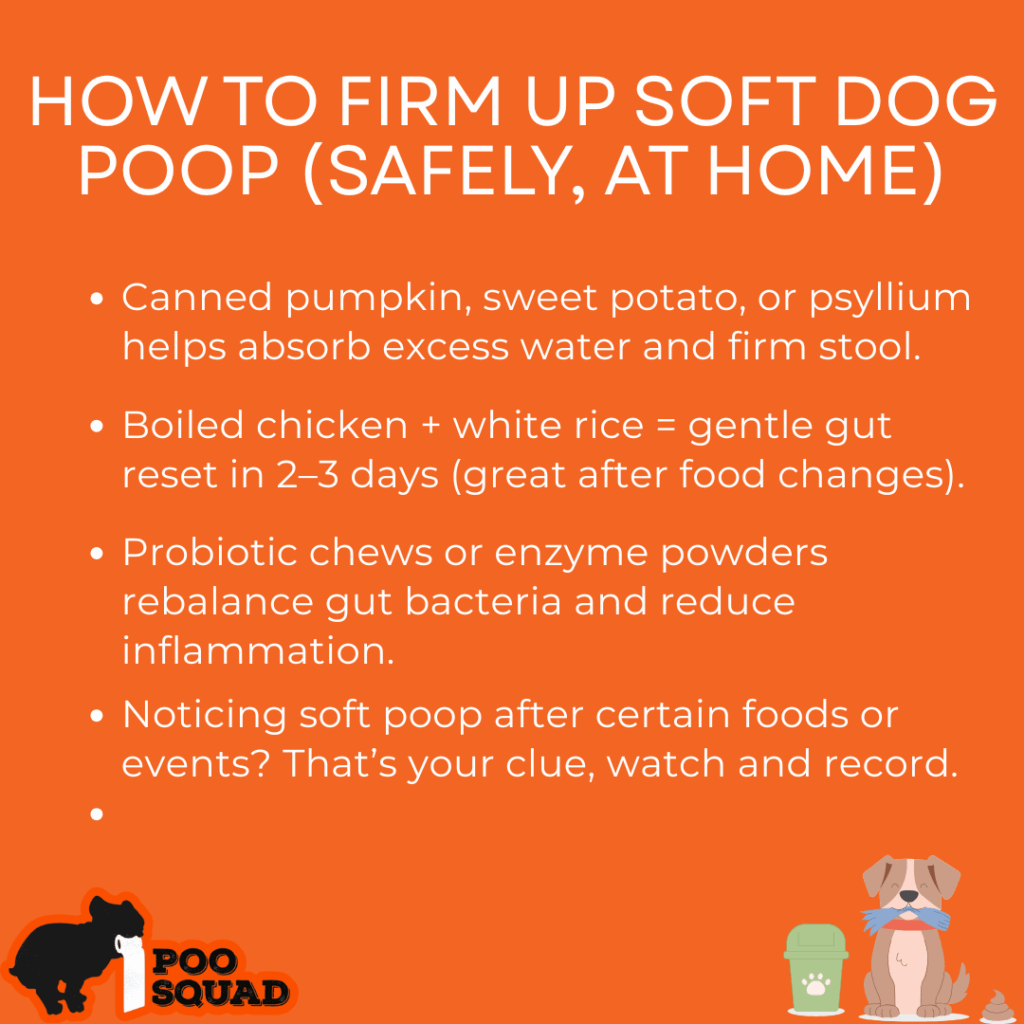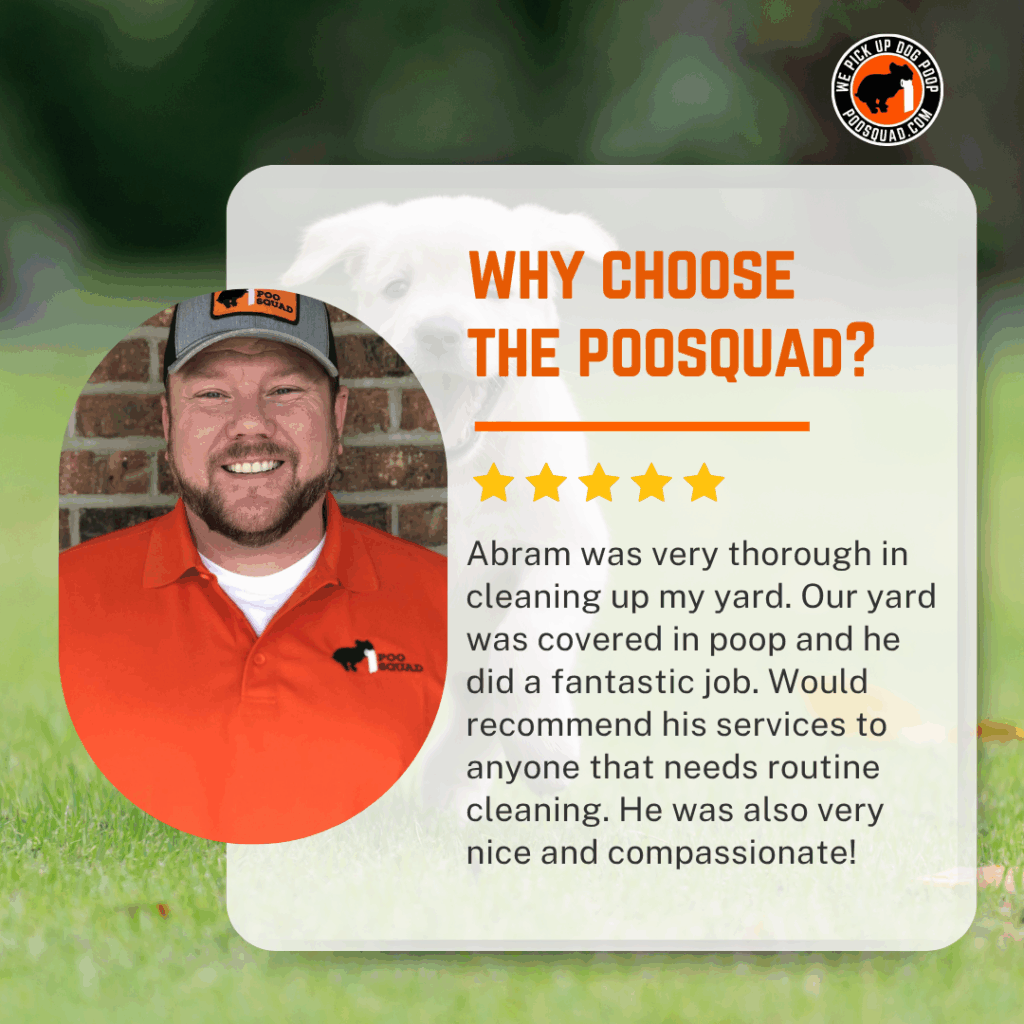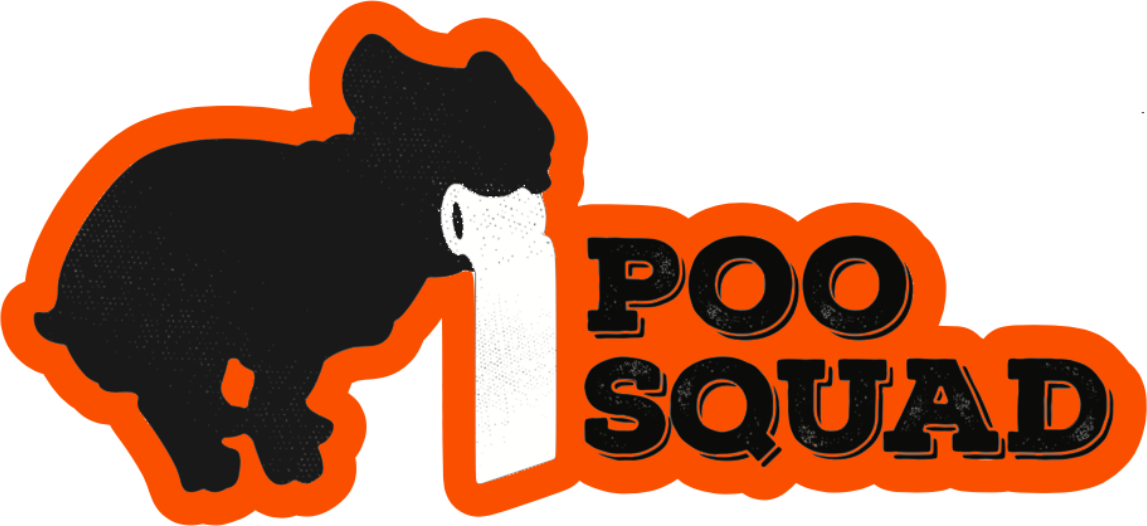Consistently soft dog poop, formed but not firm, is usually caused by overfeeding, food sensitivities, mild gut imbalances, or stress. It’s not diarrhea, but it can signal poor digestion. If it persists, adjusting diet, fiber, or adding probiotics may help; chronic cases need a vet check.
Dog poop that’s always soft, but not quite diarrhea, is one of the most common patterns we see in the yards we service. It holds its shape, but it’s mushy, sticky, and hard to clean.
While it might not seem serious, this kind of stool often signals subtle digestive imbalances, food sensitivities, or stress that’s flying under the radar.

This is not the explosive kind of poop that triggers vet visits. It’s sneakier. The texture might seem “fine” until your lawn starts to smell, the grass dies in patches, or someone finally steps in it. We’ve seen it enough that we’ve even given it nicknames, “pudding pups,” “soft-serve droppers,” and “chocolate swirls.” And every one of them tells us the same thing: your dog’s digestion is not 100% happy.
The real reasons dogs produce soft poop consistently, without tipping into full-blown diarrhea. You’ll learn what causes it, how to firm it up naturally, and when to talk to your vet.
Plus, we’ll show you how our Dog Poop Report Card catches these patterns early, so you don’t have to second-guess what you’re seeing (or smelling) in the yard.
What Is Soft Dog Poop, Exactly?

Soft poop is still formed but lacks the firmness of a typical healthy stool. It often leaves residue, spreads when picked up, or flattens under slight pressure. While it may not seem serious, this texture tells a story about your dog’s digestion and internal balance.
We’ve scooped tens of thousands of piles and can confidently say, not all dog poop is created equal. Some of it stacks neatly like logs; others?
Not so much.
The stuff we’re talking about here is not watery or urgent like diarrhea. It’s soft enough to smear into the grass, too loose to grab cleanly, and firm enough that you might think it’s “okay” until your lawn starts to suffer or the odor lingers.
Our team even has unofficial nicknames for different textures:
- “Soft-serve piles” that swirl and splatter
- “Chocolate frosting drops” that coat the grass
- “Pudding pups” whose poop is always halfway to trouble
- And the dreaded “waddling bandits”, dogs who drop a trail because they can’t pick one spot
The key is recognizing this is not “normal,” even if your dog seems fine. Healthy poop should be firm, segmented, and leave no trace when scooped. Anything softer than that might be tolerable today, but over time, it could signal stress, poor diet, or subtle inflammation.
And if the texture changes week to week, take notes or ask us for feedback. We include poop consistency updates in every Dog Poop Report Card because most owners never see what we scoop, until something’s already wrong.
Common Causes of Soft Poop That Isn’t Diarrhea
When your dog’s poop is always soft but never fully liquid, it usually means the body is trying to adapt, not panic. From food sensitivities to household stress, several manageable triggers could be behind that mushy consistency.
From the spoiled golden retriever eating steak scraps to the rescue pup navigating a new routine, and across every case, the most common causes of soft poop fall into a few core buckets:
1. Diet Changes or Overfeeding
Even a small adjustment to your dog’s food, like swapping brands or adding a new protein, can loosen their stool. Dogs have sensitive digestive systems, and sudden changes often result in what we call “soft-serve surprises.”
We also see overfeeding as a repeat offender. A little too much food (or too many treats) per meal throws off the balance between digestion speed and nutrient absorption. That extra volume can push stool through the system before it’s had time to firm up.
Many owners we meet say things like, “But the bag said 2 cups a day,” without realizing those guidelines don’t account for breed, activity level, or daily snacking. If your dog’s poop went soft right after a diet switch or portion increase, that’s likely your answer.
2. Food Sensitivities & Allergies
Some dogs simply don’t tolerate certain ingredients well, even if the food is high-quality. We’ve helped plenty of families figure out their dog’s chronic soft poop was due to a reaction to beef, chicken, dairy, or grains.
What makes this tricky is that food intolerance doesn’t always show up right away. It can build slowly, with symptoms like soft stool, itchy skin, or even constant paw licking. If you’re seeing a pattern, try logging meals and poop consistency in a notebook, or let us track it for you via our residential poop scoop service.
3. Stress or Environmental Triggers
Changes in routine, new pets, loud noises, or even your emotional energy can affect your dog’s digestion. Many soft stool cases we observe follow recent household changes, moving, vacationing, boarding, or chaotic weekends.
It’s no coincidence that we sometimes hear, “She’s been a little nervous lately… and her poop looks weird.” Stress messes with gut bacteria, slows digestion, and often leads to softer stools. In homes with kids, we’ve even seen families argue over whose job it is to clean it up, until everyone gives up, and we get a call.
4. Mild Infections or Parasites
Not all digestive bugs cause dramatic symptoms. Parasites like giardia or mild bacterial imbalances can produce consistent soft poop while the dog otherwise acts normal.
We’ve also seen cases where a dog swipes trash, eats grass, or picks something up on a walk, and the result is a week or two of mushy piles. If the poop smells especially foul, has a jelly-like coating, or contains mucus, it’s worth asking your vet for a stool test.
As a reminder, our Poop Report Card helps track this from week to week. Most customers don’t see these changes firsthand, but we do.
When Should You Be Concerned?
Soft poop is not always a crisis, but that doesn’t mean you should ignore it completely. If it sticks around too long, changes in texture or smell, or starts coming with other symptoms, it could be a sign that something deeper is going on.
We always tell clients: watch for patterns, not one-offs. A soft pile after a new treat? Probably harmless. But if your dog’s poop has been soft for over 48 hours and you’re noticing changes in appetite, behavior, or energy levels, it’s time to pay closer attention.
You should contact your vet if:
- The poop is soft and includes blood or mucus
- Your dog is acting lethargic, skipping meals, or vomiting
- There’s a sudden change in color (dark black, pale yellow, or gray)
- Soft stool lasts more than a few days without improvement
- There’s weight loss or bloating despite normal eating
One thing that often gets overlooked: smell. Extra-smelly soft poop (we’re talking ammonia and sour notes) is a red flag we see before other symptoms appear. It may suggest that something bacterial is brewing below the surface.
And don’t worry if you feel like you’re being overly cautious, we hear that a lot. Many dog owners are hesitant to bring up “poop problems” with their vet, worried it’s not serious enough. But here’s the truth: you know your dog. If something feels off, it probably is.
Our clients love that we provide weekly feedback through the Dog Poop Report Card so they’re never in the dark about subtle changes. It’s not only about scooping, it’s about watching for signs before they become problems.
How to Firm Up Soft Dog Poop at Home (Safely)
If your dog’s poop is always soft but your vet says they’re otherwise healthy, there are safe and simple ways to help get things back on track. Most solutions come down to adjusting the gut environment and supporting digestion, without overcomplicating the routine.

1. Add Soluble Fiber to Meals
One of the fastest ways to help firm up soft poop is adding soluble fiber like canned pumpkin (plain, not pie filling), psyllium husk, or unsweetened sweet potatoes. These fibers absorb excess water in the stool, helping create a firmer, more pick-up-friendly pile.
We’ve seen great results when clients mix a spoonful of pumpkin into meals a few times a week, especially for dogs that get occasional loose stool from anxiety or travel. It’s one of our go-to tips when clients ask us for help between pickups.
2. Try a Bland Diet Reset
If the soft poop started recently and you suspect food might be the trigger, consider a short bland diet. Boiled chicken and white rice are gentle on the stomach and allow the digestive system to reset.
This is not meant to be a long-term solution, but a few days of bland meals, followed by a slow reintroduction of regular food, can work wonders. If things improve during this period, you’ve likely narrowed down the issue to something in the previous food.
And yes, we’ve seen it work first-hand. One client was dealing with soft poop for weeks, and after 48 hours of bland meals, the improvement was obvious, in both the yard and the smell.
3. Introduce Probiotics or Digestive Enzymes
Soft poop can sometimes mean your dog’s gut bacteria is off balance. Probiotics, either from supplements or dog-specific yogurt-style treats, can help regulate digestion and reduce inflammation in the gut.
Look for options designed specifically for dogs. If you’re using a vet-recommended probiotic, give it at least a week to notice changes in poop texture.
Bonus tip: Some probiotic chews also help with gas and odor.
4. Monitor Timing, Texture, and Triggers
The more patterns you track, the easier it becomes to troubleshoot. Take note of when the poop goes soft, after certain meals, walks, or guests arriving? That’s a clue.
Our residential pooper scooper service clients often rely on us to spot patterns they’ve missed. We’re in the yard every week, noting whether your dog’s poop is getting softer, stinkier, or more frequent.
And if you ever need to collect a sample for the vet, we can help you know the best time and how to do it properly.
The Hidden Impact of Soft Stool at Home
Even when soft poop doesn’t seem like a medical issue, it still creates real problems at home. From lingering smells to emotional stress, it’s more than a yard nuisance; it affects your time, your relationships, and your peace of mind.
Odor and Yard Contamination
Soft poop spreads more easily into grass, sticks to shoes, and sinks into the soil, leaving a sour smell that doesn’t fade after one rainfall. We often notice these smells build up in backyards where the poop has gone uncollected for days, especially in shaded or high-traffic zones.
Our yard sanitation and deodorizer services are built for this exact reason. Regular scooping is step one. But when you’re dealing with soft piles week after week, it takes sanitization to fully remove the odor and bacteria that linger underfoot.
Poop Spreading & Missed Spots
We call them “waddling bandits”, dogs that poop while walking and leave a trail of soft piles in multiple spots. These are the cases where owners often say, “I thought I got it all,” only to find surprise smears a few feet over.
Soft poop also blends into mulch, wood chips, or dead grass. Without the firmness of a healthy pile, it hides in plain sight and spreads with every step. This becomes especially frustrating during colder months when daylight hours are short, and no one wants to hunt for poop in the dark.
Emotional Toll on Families
It’s easy to underestimate the emotional impact of chronic poop problems. We’ve seen households go from laughter to arguing in seconds over whose turn it is to clean the yard. Some of our customers even admit that the tension got so bad it sparked real fights.
One of the most touching stories we’ve heard came from a woman who had been struggling to keep up due to health issues. After her first cleanup, she cried and said, “You have no idea how much this has been weighing on me.” That’s when we knew our work meant more than scooping; it was about giving people relief and time back.
If your dog’s poop is consistently soft and it’s starting to stress you out, you don’t have to manage it alone. Our professional pooper scooper team is trained to spot these patterns, sanitize properly, and give you one less thing to worry about.
When to Call in a Pro (and Why It Helps)

Sometimes soft poop is not the problem, it’s everything that comes with it. If you’re spending weekends arguing over who’s doing yard duty, or you’re sick of second-guessing your dog’s health based on a smushed pile, it may be time to bring in backup.
Having our team on-site weekly giving you time back, peace of mind, and a second set of eyes on your dog’s digestive health. We catch patterns most owners miss because we’re looking at dozens of yards a day. We know what’s normal and what’s not.
Our service includes:
- Triple Gate Check Guarantee with photo confirmation
- Dog Poop Report Card after each visit for health insights
- ID-verified team in bright orange uniforms for safety
- Sanitized tools and shoes between yards to prevent contamination
- No use of customer trash bins, ever
We’ve had clients tell us we “saved their marriage” by taking over the one job nobody in the house wanted to do. We’ve also been the first to alert a customer that something looked off in their dog’s stool, and they were able to catch a health issue early.
If you’ve been trying to handle soft poop on your own, but it keeps piling up (literally and emotionally), you don’t have to keep going in circles. Our residential service exists to take this burden off your plate and yard.
What’s Normal, What’s Not, and What To Do
Soft stool is not always a warning sign, but it’s rarely meaningless. When your dog’s poop consistently lacks firmness, it’s your signal to pause, observe, and decide if it’s time for action. Your dog’s digestive patterns are trying to tell you something.
Most soft stool issues are solvable with small changes, better fiber, simpler diets, or fewer treats. But ignoring the issue for too long can create bigger messes: ruined yards, missed early health clues, and a lot of unnecessary stress.
Here’s what to keep in mind:
- Soft but not liquid poop usually points to digestion, not disease
- Track patterns over time, not one pile on one day
- Pay attention to changes in smell, shape, and frequency
- Don’t be afraid to get help, it’s not “lazy,” it’s smart
And if you’re tired of guessing, our Dog Poop Report Card can do the tracking for you. We’ve built our services around what real families need: no-stress cleanups, a watchful eye on your dog’s health, and a little more sanity in your schedule.
Because when you stop thinking about poop, you get to enjoy your dog a whole lot more.
FAQs: Soft Dog Poop Questions We Hear All the Time
These are the most common questions our clients ask when they’re dealing with soft dog poop, not diarrhea. These answers are based on years of real-world experience, scooping for thousands of dogs across different neighborhoods and diets.
Can too many treats cause soft stool?
Absolutely. Treats, even the “healthy” ones, can tip the balance if your dog is already sensitive. Many are high in fat or artificial ingredients, and when handed out generously, they disrupt digestion. We often see improvement when owners cut back and simplify.
What if my dog’s poop is soft but less frequent?
Less frequent doesn’t always mean better. Soft stool that only comes once a day can still be a concern, especially if it’s sticky or has a strong odor. Poop frequency should match both your dog’s size and their diet. If something changes, it’s worth noting.
Will soft poop harm my grass?
Yes. While many think it breaks down like fertilizer, dog poop is acidic and full of bacteria. Over time, it kills grass and contaminates the soil. That’s why our yard deodorizing and sanitation service is such a game-changer for families with consistent soft piles in the same spots.
Could the new treats be to blame, even if I only give a few?
Yes, especially if your dog is smaller or has a sensitive gut. We’ve seen soft poop show up after only one new chew or dental stick. Always introduce new items one at a time and keep an eye on the next day’s scoop.
Is this a sign of something chronic like IBD?
It could be. If your dog has had soft stool for weeks with no improvement, even after dietary changes, chronic conditions like inflammatory bowel disease (IBD) or malabsorption could be factors. That’s when a stool test and vet consult are key.
